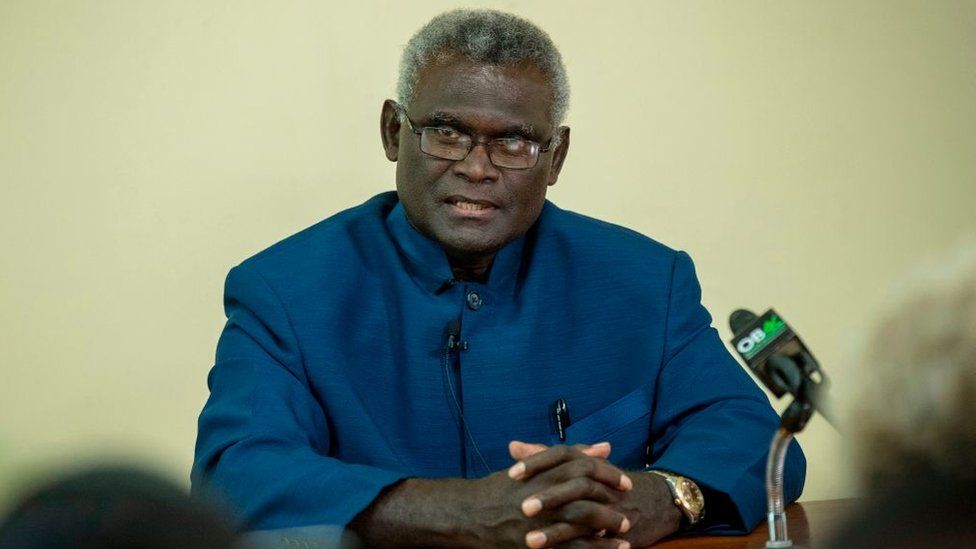You could call it a Switzerland-like foreign relations policy — just in the Pacific.
“Friends to all, enemy to none” is how Solomon Islands Prime Minister Manasseh Sogavare describes it.
The phrase itself -something Sogavare repeats over and over – has become official government policy.
Even in a nation colloquially known as the Hapi Isles, it may seem like a bit of a stretch. But these days, on the very surface at least, it seems the “policy” is paying off: Solomon Islands is more popular than ever.
Over the past three days, Sogavare’s office has been like a mini-United Nations. On Sunday, he shook hands with Japanese foreign minister Yoshimasa Hayashi – the first time in history that a Japanese foreign minister has made the trip to Honiara.
On the same day, he welcomed a delegation from the China International Development Agency, a group touring the capital to inspect key infrastructure projects, such as the new national stadium, being funded by the Chinese government.
And on Tuesday he hosted the United States Indo-Pacific coordinator Kurt Campbell -the man the Biden administration has backed to lead his country’s new-found “step-up” in the region.
It’s a busy schedule for the leader of a small, largely rural nation of about 700,000 people spread out across almost 1,000 islands.
So, why is Solomon Islands hosting so many big, superpower friends all of a sudden?
“The real flashpoint was Solomon Islands’ security agreement with China,” Lowy Institute Pacific Island Programme Director Meg Keen told the ABC.
“That] sent shock waves through the region.”
The controversial security agreement, revealed during last year’s federal election, propelled Solomon Islands into the national and international spotlight.
It came after the country switched long-held diplomatic allegiances from Taiwan to China in 2019, and stoked fears that China would build a military base in the country – a move Sogavare has constantly and aggressively denied.
Ignoring the debate over the implications of the agreement, Dr Keen says China’s increased engagement has at the very least been a “catalyst for action” for other nations, including Australia and the U.S.
“Now we’re seeing traditional partners increase their action on the ground,” she said.
“The U.S is back now, and back in multiple ways.”
Unlike his Japanese counterpart who declined to speak to the local media during his whirlwind visit, U.S Indo-Pacific coordinator Kurt Campbell held a lengthy press conference on Tuesday.
The U.S, which has been largely absent from the country since WWII, has re-emerged over the past three years, opening an embassy, re-establishing diplomatic ties and committing to help in what it described as the “urgent demands of climate change of illegal fishing”.
Speaking at the press conference – where Sogavare was not present – Campbell provided a kind-of mea culpa when talking about why the U.S had suddenly re-emerged in Solomon Islands and the Pacific more generally.
“We did not do enough before,” he said.
“And as a great nation as a big country, I think we were big enough to admit that that we need to do more, and we need to do better.
“So when you ask the question, where are you stepping up? My answer would be everywhere.”
Speaking on Solomon Islands’ security security agreement with China, Campbell was unequivocal.
He said “more transparency” over the agreement – which has never been made public – would be “appropriate”.
And, he said, the U.S delegation “made clear its expectations” around any potential Chinese military facilities “going forward”.
“And I thought that was very clear what our expectations are in this regard,” he said.
“We received very clear assurances from the prime minister that he had no intention and will not move towards creating a military facility in the Solomons that would support power projection capabilities.”
As the Sogavare government prepares to face an election early next year, on the streets of Honiara the response to these visits -and their impact – ranges wildly.
As the new national stadium nears completion, Solomon Islanders living in the capital can now see the physical results of the geopolitical tug-of-war.
Yet, according to some the ABC spoke to, many question why they’re getting a shiny new stadium for the upcoming November Pacific Games, yet the nation’s major hospital is in tatters. And issues such as endemic youth unemployment and poverty continue to hurt the nation’s development.
In a political sense, the turmoil that sparked the November 2021 riots has calmed for the time being.
Sogavare and his government continues to face criticism, particularly around its decisions to introduce Chinese policing methods into its domestic security arsenal.
Vocal anti-China critic Daniel Suidani was also pushed out of political power in his home province — a move analysts say came about in suspicious circumstances.
Yet, in a move welcomed by local journalists, the government’s attempts to quell the media have calmed, with ministers now conducting weekly press conferences.
According to Dr Keen, Sogavare’s hold on power is “finely balanced”.
“He has to be seen to be delivering,” she said. “He’s getting attention and resources and he’s getting global leaders to come to the table.
“But it’s a delicate balance, this is a tough geopolitical game to play well while navigating domestic sensitivities.”
International diplomacy may be one thing, but domestic politics — and clinging to power — is another. With that in mind, perhaps a new phrase is more appropriate: “Friends to none, enemies to some”
SOURCE: ABC PACIFIC/PACNEWS














